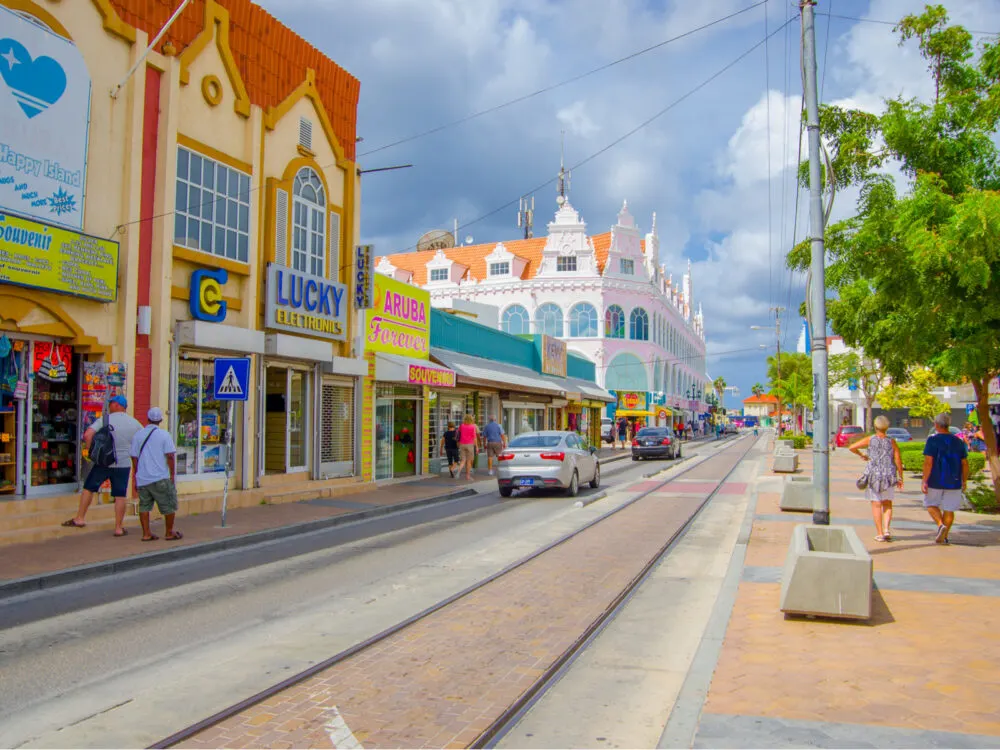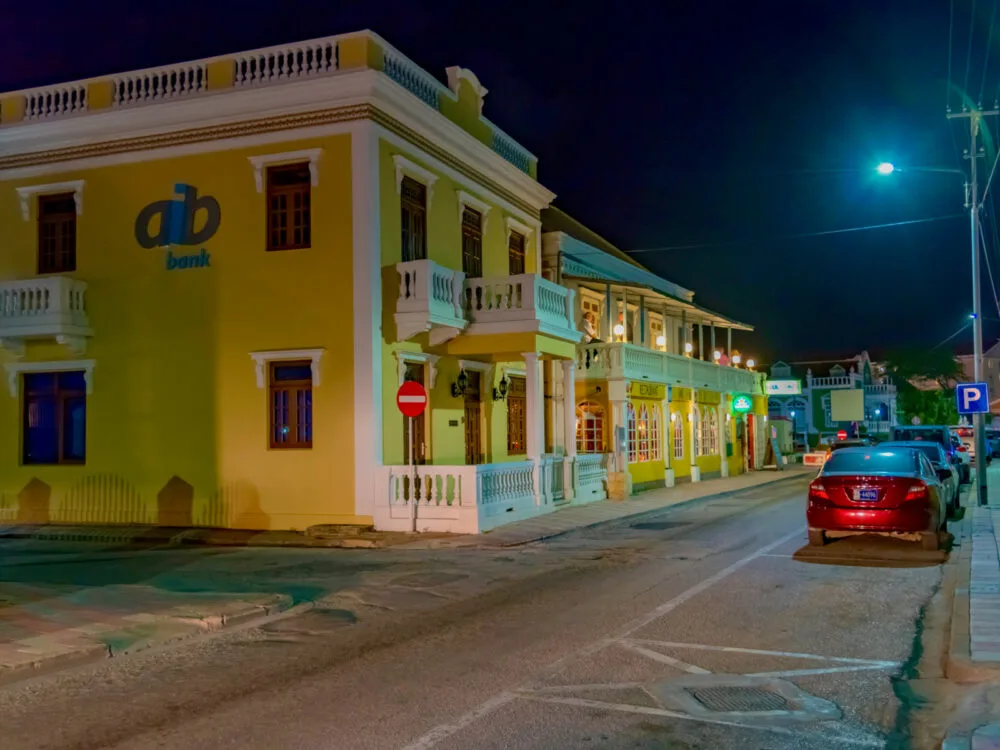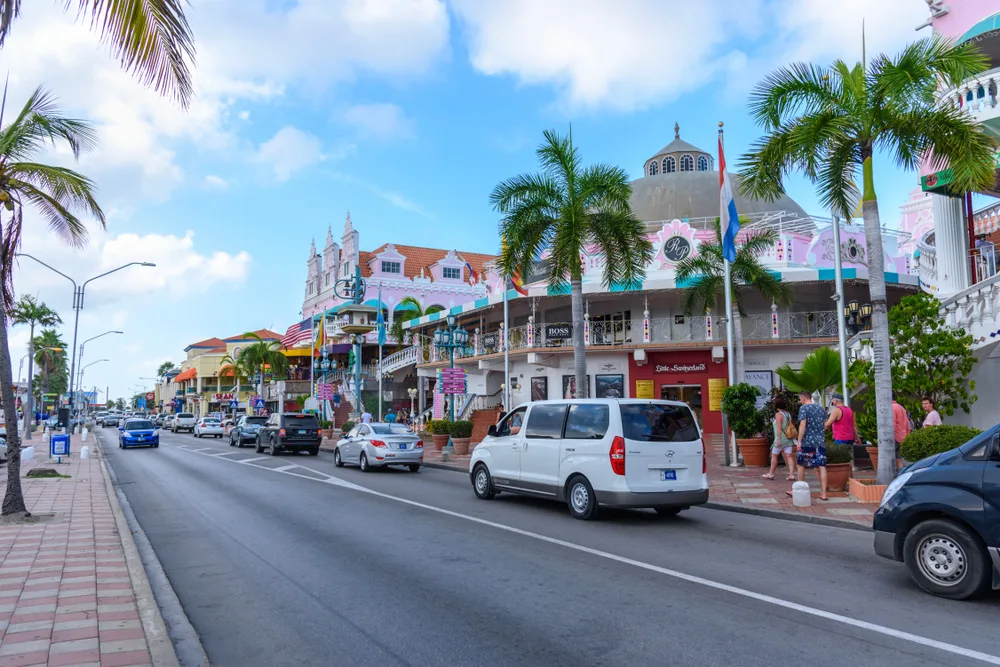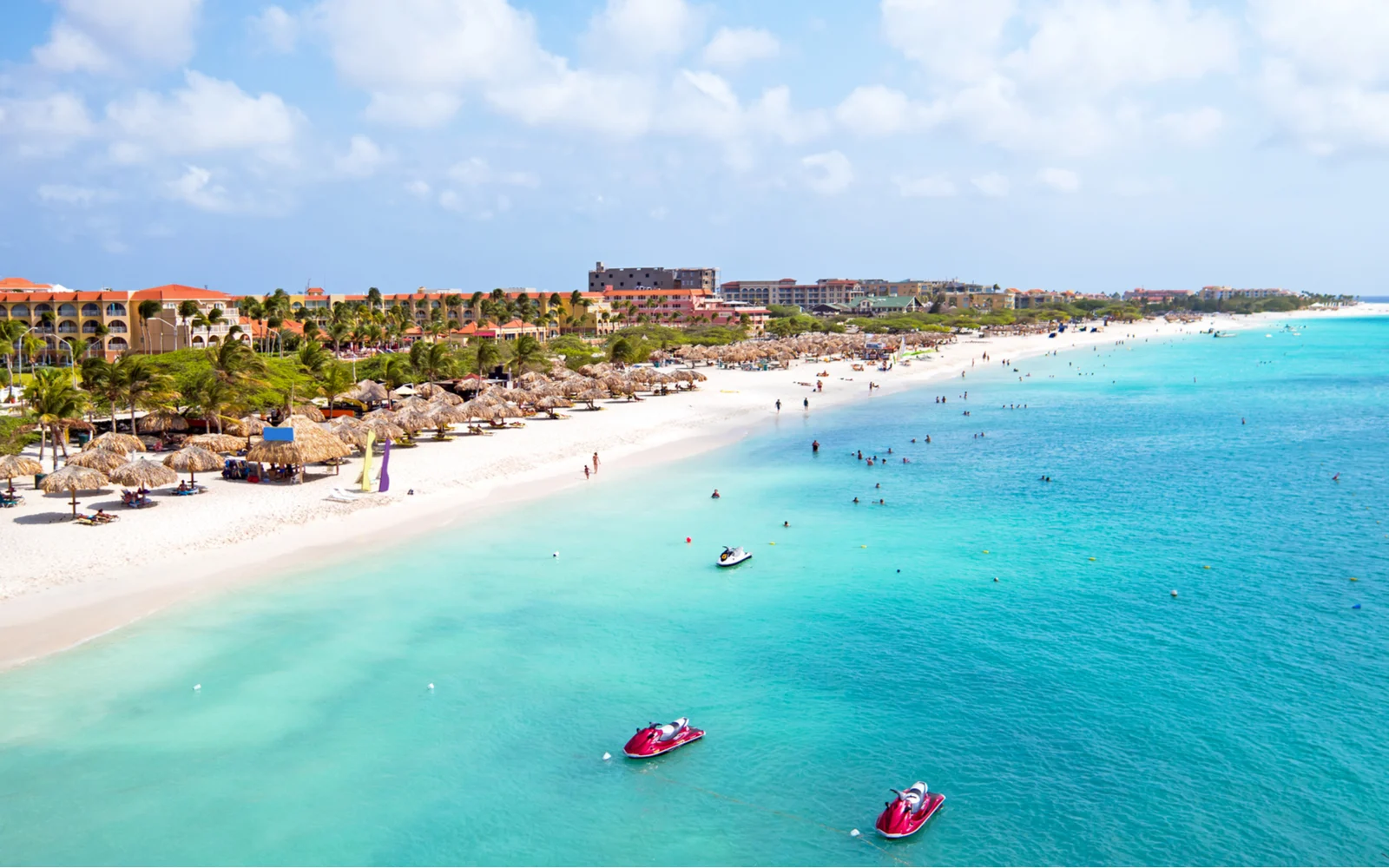Is Aruba safe to visit in 2026?
Aruba is known for its safety, boasting low crime rates that make it a secure destination for travelers. While petty theft can occur, violent crimes are exceptionally rare, allowing tourists to enjoy their trip with basic precautions. Its reputation for safety and good infrastructure make it an excellent choice for a worry-free vacation.
Aruba is one of the most beautiful destinations in the Caribbean. The pristine island country, which is technically part of the Kingdom of the Netherlands, receives two million visitors a year, which is a high number for such a small country.
It actually receives the fifth most visitors per capita in the world. Most people come to Aruba in search of beautiful beaches, from the pretty sands of world-famous Eagle Beach to the bustling nightlife of Palm Beach.
Many visitors are pleasantly surprised by the multicultural, vibrant atmosphere of the capital Oranjestad, whose colorful facades match the colorful characters that call it home. But while it may seem like a tropical paradise, is Aruba safe to visit? Here’s our expert opionion.
Is Aruba Safe to Visit?

Natalia Barsukova/Shutterstock
Yes. You’ll be happy to know that Aruba is very safe to visit! In fact, it’s one of the safest Caribbean destinations. It has a very low crime rate and besides a few common-sense precautions, you won’t need to be on your guard when you’re there.
Travel advisories from other countries can help confirm just how safe Aruba is. The United States just tells its citizens to exercise normal precautions while they visit, placing Aruba under a Level One travel advisory, the lowest possible rating.
Most other governments agree. Aruba has a reputation for being one of the safest islands in the Caribbean.
It helps that the island is relatively small, with a small population, meaning that criminals don’t have anywhere to hide. The crime rate is very low, and what crime does occur usually affects locals, not tourists.
The official Aruba tourism website lists other factors why Aruba is so safe, including easy transportation, good infrastructure, and benevolent weather. Crimes do occur in Aruba because even though it looks like paradise, it is still a place on Earth.
Some of the most common crimes in Aruba include:
- Pickpocketing
- Scams
- Hotel break-ins
- Vehicle break-ins
- Vehicle theft
- Gang-related crimes
Although these incidents can occur, they are very rare. In terms of safety, there are other factors you should consider besides crime. Aruba lies outside of the Caribbean hurricane belt, meaning that it is safe to travel to in the summer.
However, you should hydrate and apply plenty of sunscreen as the summers get very hot! If you’re going out into nature, especially if you are trying out some water sports, be sure that you are following safety procedures as you do so.
Some Aruban beaches have strong currents and riptides, so don’t swim out too far from shore.
Currents are particularly strong around the northern end of the island, while beaches on the south are more beginner-friendly. If you are diving, follow directions and don’t come up too fast to prevent “the bends.”
Crime in Aruba

Fotos593/Shutterstock
The most common problem people worry about when going abroad is crime. Crime is particularly a concern in the Caribbean, where some countries have some of the highest crime rates in the world.
Luckily, Aruba is mostly free from that problem. It has some of the lowest crime rates in the Caribbean and in the world. Violent crime in Aruba is practically nonexistent.
For example, the homicide rate according to World Bank data is just 2 incidents per 100,000 people, which is far below the global average. The rates of other violent crimes such as kidnapping and rape are also low.
There have been a few high-profile incidents, such as the 2005 murder of American high school senior Natalee Holloway, but incidents such as this one are very, very rare.
Aruba does have some problems with crime. The most common crime tourists will encounter is property crime. According to Numbeo, although Aruba does have a low overall rating on the crime scale (23.45 out of 100), a majority of respondents believe that crime is rising.
They are particularly concerned about drug abuse and other petty crimes. Anecdotal evidence, for example traveler forums, backs up the idea that property crime, including crime against tourists, is rising.
Aruba does struggle with more serious crime, from local criminal gangs to international organized crime syndicates that use the island as a base. Aruba still plays a strong role in the international drug trade.
Although the situation is not nearly as bad as it used to be in the 1990s, when the Italian mafia attempted to engineer a hostile takeover of Aruba, international crime syndicates still have a presence on the island and use it to move drugs to other parts of the world.
However, keep in mind that these crimes rarely affect tourists, unless you really do something drastic to get yourself on the radar of international criminals.
Overall, there is very little crime in Aruba, and especially very little crime that will affect a tourist. As long as you take basic precautions, you should feel completely safe when you are there.
Of course, Aruba has its problems, just like anywhere else in the world, but these problems are unlikely to affect the casual visitor.
Petty Theft
The most common crime affecting visitors to Aruba, and anywhere else, is petty theft. Petty theft is a crime of opportunity, meaning that thieves just look for a narrow possibility to take something valuable from a distracted person instead of needing to violently take someone’s possessions.
While petty theft can be inconvenient and embarrassing, at least it doesn’t come with the price of your life. Pickpocketing, bag snatching, and beach theft are the most common forms of petty theft in Aruba.
Rates of theft on the island usually pick up during the tourism high season and festivals such as Carnival, which lasts from January to March.
When more people are on the island and crowds throng the streets of Oranjestad and other towns, thieves take advantage of the collective distraction to take people’s valuables.
Sometimes, the thieves are other travelers blending in with the crowds as opposed to locals! Luckily, petty theft is fairly easy to prevent, especially when it is rarely accompanied by violence, as is the case in Aruba.
Just make sure that criminals of opportunity don’t have the opportunity to take from you. Keep a close eye on your valuables, even when you’re out having fun. Put them in a secure pocket or bag instead of somewhere where someone can take them without notice.
While you don’t have to worry about putting your phone or camera away the way you might in other Caribbean destinations, it’s still a good idea not to wear flashy jewelry or expensive watches.
You should be particularly careful when going to the beach. The UK government warns its citizens traveling to Aruba not to take many valuables to the beach.
You never know who might be rifling through your bag while you are frolicking in the water. You shouldn’t even take your ID with you — a copy of your passport is the best way to satisfy police requirements while staying on the beach.
Break-Ins
Another crime that frequently targets tourists in Aruba is break-ins, both accommodation break-ins and vehicle break-ins. The Canadian government warns about the prevalence of this type of crime.
There have been incidents of thieves breaking into hotel rooms and stealing valuables such as jewelry, cash, and technological equipment. The best way to prevent this from happening is to put your valuables in a hotel room safe or hotel lobby safe when you are not using them.
Whenever you leave your hotel room, lock the door and make sure that all windows are closed. Always do research on the security of your hotel and make sure that you don’t tell new acquaintances too many details about where you are staying.
Vehicle break-ins also occur in Aruba. Rental cars are often targeted by criminals for break-ins and for theft because they know that tourists often forget to take basic precautions.
Never leave valuables in your car, especially not visible. Put possessions under the seat, in a glove compartment, or trunk. When you’re renting a car, make sure that you get comprehensive rental insurance that also covers you in case of theft.
Avoiding Bad Areas

DiegoMariottini/Shutterstock
Avoiding sketchy areas can help you stay safe in Aruba. They are very rare on the island, but there are still some parts that you should be careful when visiting.
The most common area people will tell you to avoid on Aruba is San Nicolas. Aruba’s second-largest city is a popular nightlife destination, but it has some sketchy areas that double as a red light district. If you are alone, avoid walking around at night.
Some isolated beaches in Aruba are also home to criminals, including potential muggers, who take advantage of the isolation since they know victims can’t easily call for help. Before you check out a new beach, ask locals for advice if it is safe or not.
Things to Consider
Here are a few additional things to consider when you are visiting Aruba:
- The Aruban government has a code of conduct they ask visitors to follow if they want to visit the island respectfully. Only wear your bathing suit to the beach, not for walking around town, and don’t engage in nude or topless sunbathing as it is illegal. Follow posted signs about driving or parking to avoid damaging the landscape.
- Arubans take their environment seriously, so seriously that plastic bags are actually banned on the island. Follow their lead by picking up all trash, including cigarette butts, not climbing or damaging the fragile Fofoti trees, and not disturbing wildlife by feeding them or taking them home for souvenirs.
- Most shops accept both US dollars and local florins, but some places only accept florins, so it helps to have some on hand. Make sure that you always have cash because you can’t always pay with a card, for example for public restroom fees.
- Public transportation is infrequent, and taxis are expensive, so many tourists opt to rent a car to get around the island.
Frequently Asked Questions

Oranjestad, Aruba – January 8, 2018: View of the main street of the picturesque town of Oranjestad/Marco Bicci/Shutterstock
Here are some common questions you’ll also want to know the answers to before going to Aruba.
What should I be careful of in Aruba?
Be careful of going out in Aruba, as some areas get sketchy at night, especially if you are alone. You should also be careful of traveling to isolated areas, and make sure someone else always knows your itinerary.
Is Aruba safe for tourists 2023?
Yes, Aruba is very safe for tourists in 2023. The crime rate is just as low as it’s ever been, and the risk of natural disasters such as hurricanes is very low.
Is it safe to walk around Aruba at night?
In most of Aruba, it is safe to walk around at night. However, be careful when going into the red light district of San Nicolas or to isolated areas.
What is the best month to go to Aruba?
Contrary to most advice for travel to the Caribbean, the best month to go to Aruba is any month between April and August. Prices drop during this low season, crowds thin out, and you are not at risk of hurricanes on Aruba.
Is it safe to swim in the ocean in Aruba?
For the most part, it is safe to swim in the ocean in Aruba. However, some beaches on the northern point of the island have strong currents or riptides, so check water conditions before you go swimming.
So, Is Aruba Safe to Visit?
If you’re looking for a safe place to visit in the Caribbean, Aruba is one of the best destinations that you can pick. It has a very low crime rate, and most tourists have an excellent time. So, what are you waiting for — book your trip today!



